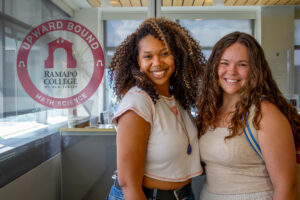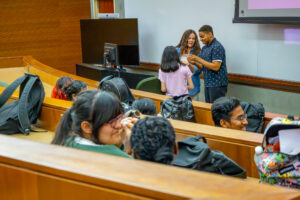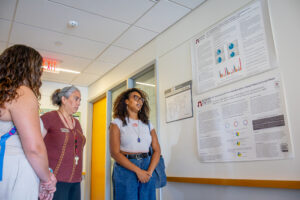- About Ramapo
- Academics
- Admissions & Aid
- Student Life
- Athletics
- Alumni
- Arts & Community
- Quick Links
- Apply
- Visit
- Give
Double Impact: Academic and Emotional Support Propel Teens to College

July 24, 2025
by Lauren Ferguson
For three decades, the Upward Bound Math and Science program at Ramapo College of New Jersey has empowered high school students from disadvantaged backgrounds to earn their diplomas and prepare for college.
Throughout their high school years, low-income and first-generation students from Paterson, NJ, who qualify for the program receive support such as tutoring, college tours, and seminars in areas like financial aid, college admissions, and career counseling.
They also spend six weeks each summer living on Ramapo’s Mahwah campus, taking courses in subjects such as science, math, language arts, and Latin, and getting a feel for college life. They are exposed to college science labs, field trips to go fly fishing, swimming and ice skating, and opportunities to give back through area non-profits.
But a few years ago, the program’s director realized that in order for the teenagers to truly focus and succeed academically, they first needed support dealing with real-life issues, and their emotions surrounding them.
Recognizing Roadblocks
“The problem isn’t trying to help them learn this material, the problem is everything else is getting in the way,” said Dr. Sandra Suarez, Ramapo’s director of Upward Bound, who also serves as director of the college’s STEM Center.
The teens have experienced things like losing family members, parents getting divorced, or having anxiety or being stressed out themselves, Suarez explained. “The goal of the program is to help them achieve academically, but this is an obstacle,” she said.
So when Assistant Professor of Social Work Dr. Colleen Martinez offered to lend her expertise, as well as a student intern from Ramapo’s Master of Social Work (MSW) program, Suarez recognized it as a win-win.
Martinez, a licensed clinical social worker and registered play therapist, previously worked as a psychotherapist for young people. She still volunteers at camps, helping young people have a good time in groups and in natural settings.
“I know that when you bring groups of people together, especially people who have been under-resourced, that there’s a lot of trauma and there’s a lot of hardship and adversity,” Martinez said. “I had a feeling that Sandra was serving kids that had a lot of needs, and so I wanted to help her with that.”
Gaining Hands-On Experience
Martinez now advises a MSW intern who serves as a social emotional learning (SEL) counselor to the high school students. The internship provides the MSW intern with hands-on experiential learning, and access to a mentoring, encouraging faculty advisor, both hallmarks of a Ramapo education. And the experience is right on campus.
“They’re working with at-risk individuals, very smart people who have a lot of life challenges,” said Cardacia Davis, director of practicum education for Ramapo’s social work program. “So it still gives students an opportunity to be able to work with a very vulnerable group of people without going outside of here.”
The MSW intern uses the evidence-based RULER approach to SEL, developed at the Yale Center for Emotional Intelligence. The intern provides a multi-tiered system of support to the high schoolers, ranging from one-on-one sessions with students who are determined to need the most support, to small groups of students on specific topics such as grief and toxic relationships, to large groups of the entire Upward Bound program on character development themes such as acceptance and demeanor.
“The RULER approach basically says that we’re listening to the emotions of others, we’re practicing regulating our emotions, we’re practicing understanding our emotions, labeling our emotions, expressing our emotions. And we, in turn, use all of that to help the students gain more of an understanding about themselves and how they can utilize that in their education,” said MSW student Tijani Browne ‘26. “Because sometimes when you’re not emotionally regulated, it could be really hard to focus on your schoolwork.”
Browne, of Bogota, NJ, spent last year as an SEL counselor with a caseload of students who could benefit from one-on-one support. She also conducted assessments, ran small groups, dubbed “Deep Dives with TJ,” and large groups focused on character development, provided brain breaks during tutoring sessions, and even put together guidelines, or policy, for incoming MSW interns to follow.

MSW student Sara Gustavsen ‘26 facilitates a large group session on demeanor with Upward Bound students.
Browne’s successor, MSW student Sara Gustavsen ‘26, of Pequannock, NJ, is following her lead this summer. She kicked off the large group sessions with a program on acceptance.
“There’s just a lot of newness going on with coming to this program and they worked hard academically, so there’s a lot of challenge and discomfort,” Gustavsen explained. “So we were talking about the importance of being able to be comfortable with discomfort and accept that challenge.”
Witnessing the Impact
Gustavsen is the fifth MSW student to intern with the Upward Bound program so far. Suarez said they are now collecting data on whether the high school students are becoming more emotionally aware, resilient, or regulated, after having access to an SEL counselor, and they are hoping to publish the results at some point.
But Browne, who also conducted a research project for Ramapo’s 2025 Scholars’ Day entitled “SEL Interventions with First-Generation and Low-Income Students in Upward Bound,” said the quotes from the students she has helped are already showing the impact.
One student said: “SEL counseling has helped me in two big ways. First, it taught me how to handle stress better, especially with schoolwork and other responsibilities. Instead of freaking out over deadlines, I’ve learned ways to stay calm and manage my time. Second, it helped me communicate better with people. I’m more comfortable expressing how I feel and dealing with conflicts without me making things worse. It made my relationships with friends, teachers, and even family a lot easier.”

MSW student Tijani Browne ‘26 reads from the research poster she created, as Dr. Sandra Suarez looks on.
For Martinez, who no longer handles a caseload herself, witnessing the impact that her graduate students are making is fulfilling. “It’s really nice to know that through the MSW students’ work, we’re touching the lives of so many young people. We’re not just teaching them math and science and English and writing college essays, but also about their feelings, their families, their lives and their hopes and dreams,” Martinez said.
The Upward Bound Math and Science program – funded by the U.S. Department of Education (DOE) – is part of the Federal TRIO Programs, a group of eight initiatives designed to assist low-income individuals, first-generation college students, and individuals with disabilities to progress through the academic pipeline from middle school to postbaccalaureate programs, according to the DOE.
This critical federal funding allows high school students from disadvantaged backgrounds to gain academic support, tutoring and exposure to thrive, and ultimately, access to the colleges that best suit them. Launched in 1995, Ramapo’s Upward Bound Math and Science program now has close to 1,000 alumni.
To learn more, visit Ramapo’s Upward Bound Math and Science webpage.
Copyright ©2025 Ramapo College Of New Jersey. Statements And Policies. Contact Webmaster.

Follow Ramapo